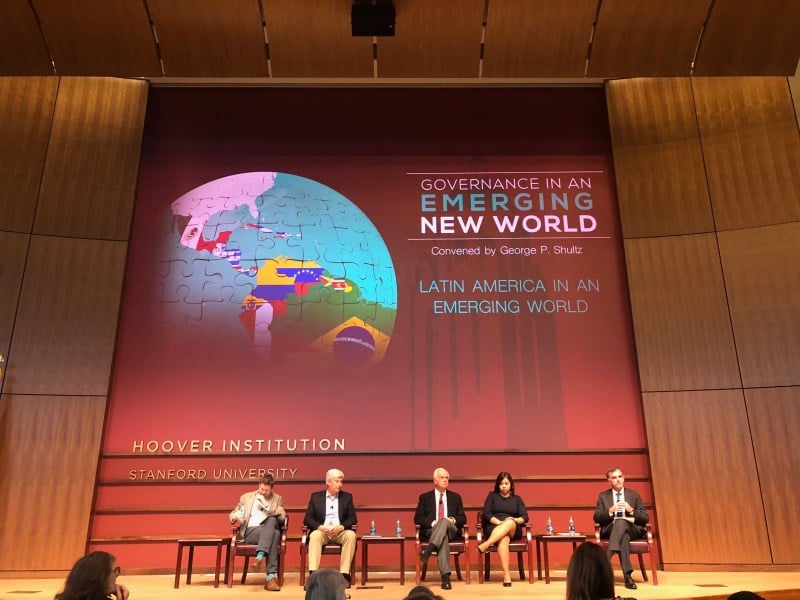On Monday, the Hoover Institution held a panel discussion on Latin America’s upcoming governance challenges as a part of its series “Governance in an Emerging World.” The event focused on demographic shifts, the digital economy and drug violence and highlighted the potential for privately-funded, micro-level solutions in meeting government service delivery.
Held at Hauck Auditorium, the event began with remarks from former US Secretary of State George P. Schultz, a Distinguished Fellow at the Hoover Institution who spearheaded the series. The panel included Ernesto Silva, former president of the Union Democrata Independiente (UDI) party in Chile; Claudia Masferrer Leon, assistant professor at El Colegio de Mexico; Ben Sywulka ’03, founder of Hapi.vc, which coordinates resource access to low-income entrepreneurs; and Richard Aitkenhead, former Guatemalan Minister of Economics. The panel was moderated by Pedo Aspe, former Secretary of Finance in Mexico.
Silva kicked off the panel discussion. Citing the steady economic growth and democratization of most Latin American countries over the last three decades, he said he had “rational optimism” for the region’s future, despite the challenges of drug-related violence and cybersecurity. He identified the emergence of financial technology and e-health technologies as areas of promise for Latin America’s digital transformation, which could help governments provide social services to citizens.
Sywulka continued the discussion by highlighting the importance of digital innovation in Central America. Drawing upon his current work with Hapi.vc, Sywulka advocated the use of self-employment platforms analogous to Uber and AirBnB to generate economic growth.
“For the first time in history, you can generate self-employment in a way that is scalable, where the cost of onboarding people to self-employment platforms is lower, training them is lower, and controlling and operating these platforms is a lot lower,” he said.
Self-employment platforms, for Sywulka, were “more aligned with the realities of [Central America]” where 70 percent of employment is generated through the informal sector.
Leon continued the discussion by highlighting demographic shifts in Mexico and the “Northern Triangle,” which consists of Guatemala, Honduras and El Salvador. Though the region has experienced improvements in infant mortality and overall health, drug-related violence continues to drive emigration and displacement. However, Leon emphasized that such emigration varied across the four countries.
“One of the main messages I want you to take today is that although in demographic indicators these four countries look similar, in terms of migration they look very different,” she said. “Today, Mexican migration to the United States is at its low point, though the flows in Central America have been increasing.”
In a discussion that at times lacked the intensity and dialogue of previous events in the series, one issue that drew divergent opinions from the speakers was how to best fight the drug war. Secretary Schultz opposed a supply-oriented approach towards reducing drug use.
“If you try to cure the problem by restricting supply, you lose,” he said. “It just doesn’t work … anybody taking drugs gets thrown into jail, so our jails are full of young kids who took a drug. And what do you learn when you’re in jail? You learn how to be a real criminal.”
Aspe agreed, pointing to Portugal, where the decriminalization of drug consumption led to broader rehabilitative efforts to wean citizens of drug dependency.
Silva, however, citing his own personal experience with Chilean constituents, pushed against demand-based approaches towards fighting drug consumption.
“I understand there are good reasons for decriminalizing,” he said. “I had to go see my constituents, and many of them in poor locations were suffering with drugs, and they wouldn’t understand that a politician would support the idea of decriminalizing drugs … They need more time and debate,” he said.
The event ended with a brief question-and-answer session. Audience members asked questions on both private-sector and government-oriented solutions to fight the problems presented in the talk. They also expressed their personal stakes in the issues discussed.
“I am from Mexico, so I think that topics about Latin America and the interaction between Latin America and U.S. are super important,” Christian Gonzalez-Rojas M.S. ’19 said.
“I’m very interested in the interaction between the war on drugs and violence in Latin America with consumption in the U.S.,” he added. “I think it’s something that hasn’t been addressed correctly lately, so the fact that it came up was interesting.”
For Jannik Zgraggen, a visiting student researcher at the Autonomous Systems Lab, the panel discussion failed to bring forth new perspectives on over-discussed topics.
“It wasn’t revolutionary. It was describing problems which are already known like education and the war on drugs. It wasn’t that solution-based,” Zgraggen said.
Nonetheless, he took interest in Sywulka’s discussion of self-employment platforms and digital employment opportunities.
The next event in the series will focus on Africa and will take place on Jan. 14.
Contact Berber Jin at fjin16 ‘at’ stanford.edu.
